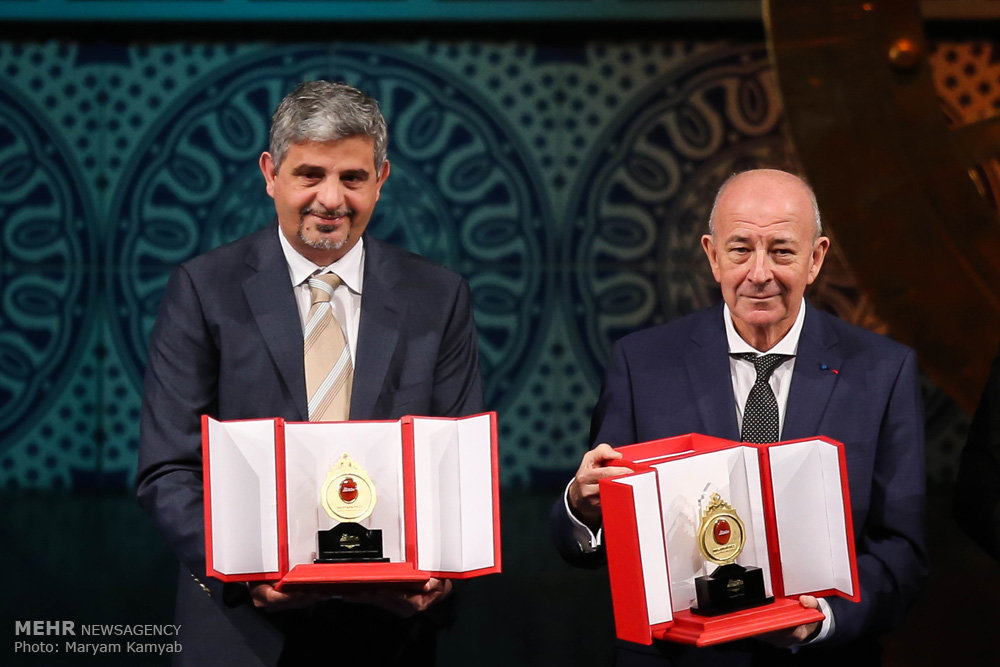Iranian and Turkish scientists awarded Mustafa Prize

TEHRAN - In the 2017 Mustafa Prize ceremony, held at Tehran’s Vahdat Hall on Sunday, two Muslim scientists from Iran and Turkey received the prestigious prize for their pioneering achievements.
By Marjan Golpira
Held biennially, the Mustafa Prize is a science and technology award, granted to top researchers and scientists from the Organization of Islamic Cooperation (OIC) member states.
The ceremony coincided with the birth anniversary of the Prophet Muhammad, with over 60 prominent scholars and scientists from Islamic countries and senior Iranian officials such as Ali Akbar Salehi, head of the Atomic Energy Organization, and Sorena Sattari, Iran's vice-president for science and technology.
The two Mustafa Prize awards this year went to Sami Erol Gelenbe, from Turkey, and M. Amin Shokrollahi who was born in Iran and lives in Switzerland now.
The laureates received the Mustafa Medal, a diploma and $500,000 prize.
The Information and Communications Technology (ICT) award was given to Professor Gelenbe, a computer scientist, electronic engineer and applied mathematician for his pioneering research on “Modeling and Performance Evaluation of Computer Systems”.
Professor Shokrollahi, an Iranian professor of math and computer science, who worked on a variety of topics including coding theory and algebraic complexity theory, was honored for his “Technology and Information Theory”.
The keynote speaker, Mahdi Safarinia, secretary of the Mustafa Prize Policy-making Council, said the prize is not just a “mere award” but a “social move” to bring Islamic states together through scientific activities.
The goal of Mustafa Prize, he said, is to “back up and develop science and technology” and “improve international cooperation”.
Safarinia then noted that some 400 leaders endowed the foundation to make it the world’s biggest Islamic fund in the development of science and technology.
Laureates of Mustafa Prize are society’s role models: TWAS director
Another speaker at the event was Prof. Romain Murenzi, the executive director of the World Academy of Sciences (TWAS) for the advancement of science in developing countries who called the laureates “role models” for society.
“These role models constantly work strenuously to carry out social responsibilities and to identify the appropriate symbols of social and scientific responsibility.”
He also said the Mustafa Prize has set the stage for “creative students” to address challenges in society.
Murenzi further stated that the cooperation of Islamic scientists in science and technology empowers the Islamic world as a whole.
“The synergy of science and technology, like during the golden era of Islamic civilization, definitely will bring about a significant progress for humanity.”
Iran is likely to take the lead recognizing Muslim scientists, says Iran’s atomic chief
On the sidelines of the ceremony, Ali Akbar Salehi, the vice President and head of the Atomic Energy Organization of Iran, told the Tehran Times that Iran, as one of the 57 Islamic countries worldwide, is one of the “forerunners” in science and technology.
Praising Iran’s achievement following the Islamic Revolution some 40 years ago, Salehi, an MIT graduate scientist, said despite constrains and sanctions imposed on the country “Iran has been able to do so much in science and technology.”
“Iran is apt to take the lead in identifying and recognizing Muslim scientists all around the world and bringing these Muslim scientists together, so they could cooperate with each other to enhance and promote advances in the Islamic World.”
Laureates of Mustafa Prize
The two laureates of the Mustafa Prize briefly spoke to the Tehran Times about the importance of the distinguished award. Dr. Shokrollah held out hope that the awards event will become increasingly significant.
“All indications show that it is going to become a major award in line with the largest awards given in the world of science.”
Dr. Gelenbe, for his part, told the Tehran Times that recognition of the award can “reestablish links across the Muslim world.”
The first two previous rewards were in nanotechnologies, health sciences and drug delivery and the two this year were in the field of securing networks and mathematics.
The first round of the Mustafa Prize awards occurred in 2015 in Tehran in which Professor Omar Yaghi from Jordan, a specialist in nanosciences, and Professor Jackie Ying from Singapore in bio-nanotechnology category, were the recipients.
Leave a Comment